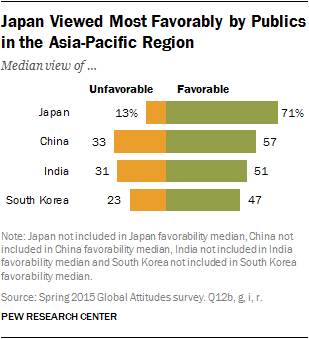
The coming decades promise to be the Asian Century, when the most populous region, with some of the world’s fastest growing economies, is likely to become the global nexus of commercial, cultural and geopolitical activity. For this reason, how people in the Asia-Pacific region, including Australia, see each other and their leaders is of growing importance.
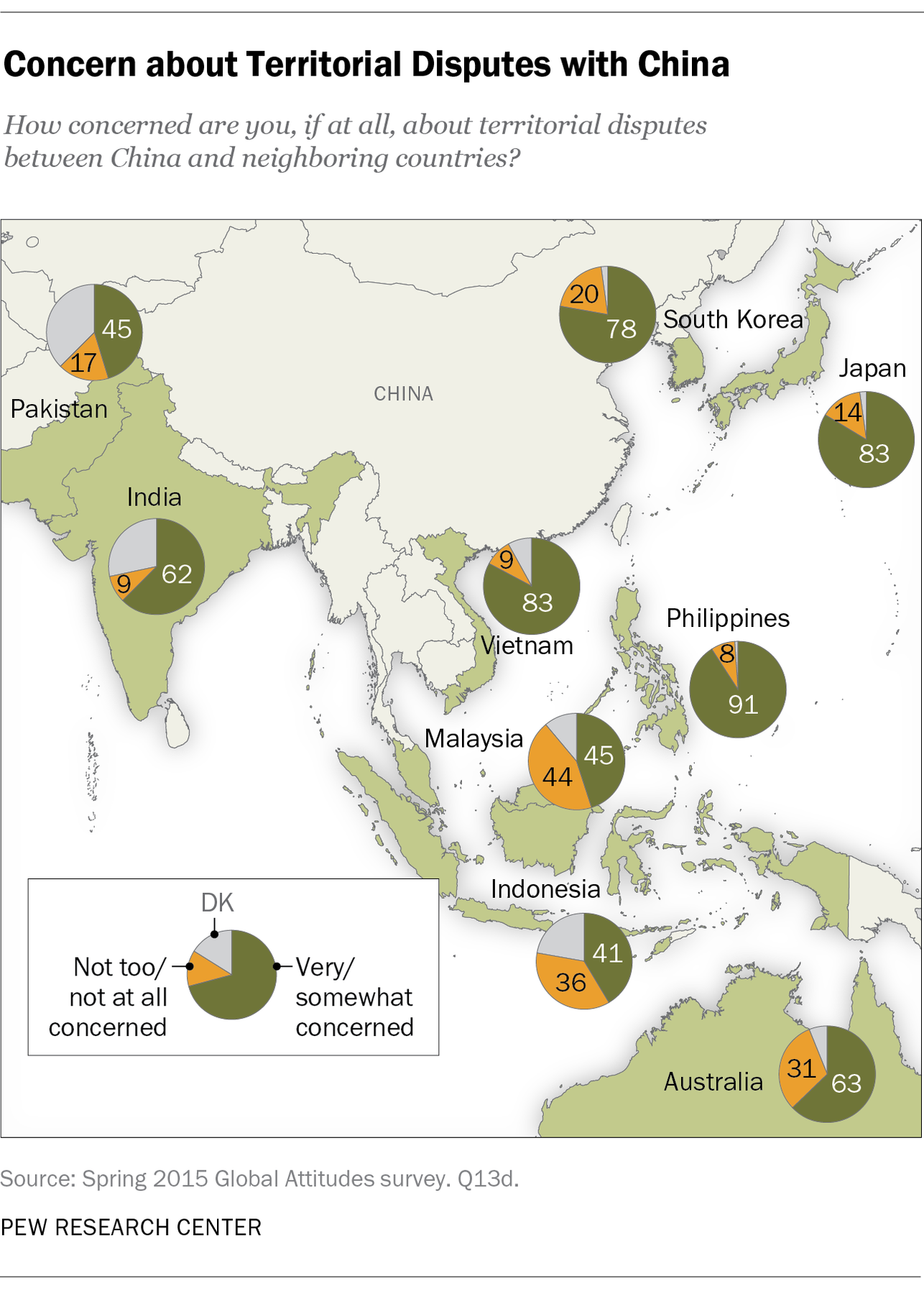
Overall, despite historical and territorial frictions, Asia-Pacific publics tend to view their regional neighbors in a positive light, with Japan judged most favorably. But these same publics also express limited confidence in the region’s most prominent national leaders when it comes to their handling of international issues. These are some of the findings from a new Pew Research Center survey of 15,313 people in 10 Asia-Pacific nations and the U.S. conducted from April 6 to May 27, 2015.
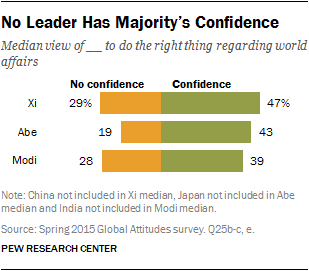
Views of Each Other
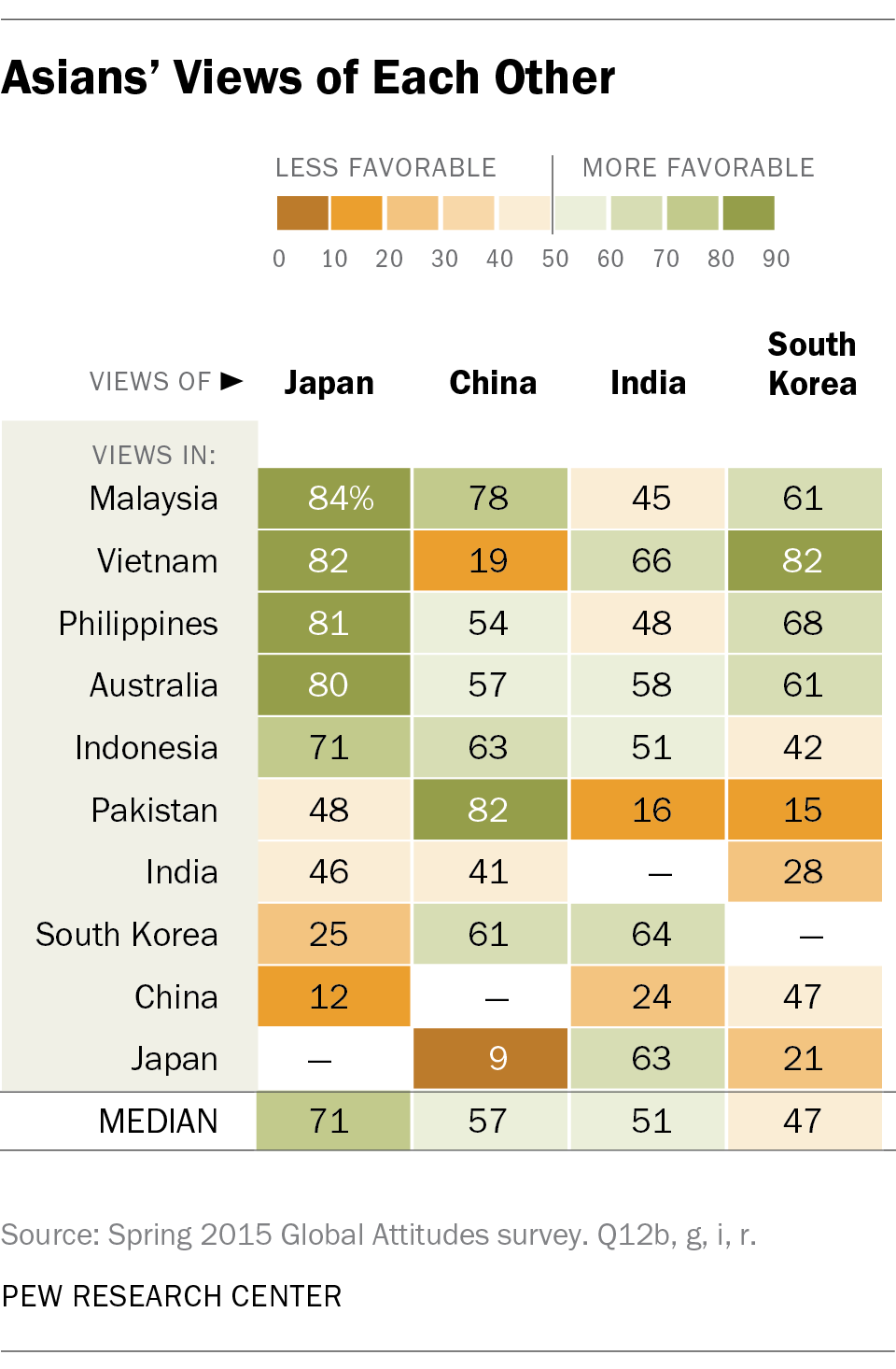
Publics in the Asia-Pacific region generally see each other favorably, with a few exceptions that reflect deeper historical antagonisms, especially between China, Japan and South Korea.
Japan enjoys a relatively positive image, except in China and South Korea. Eight-in-ten or more Malaysians (84%), Vietnamese (82%), Filipinos (81%) and Australians (80%) express a favorable opinion of Japan. About seven-in-ten Indonesians (71%) agree. Such views are largely unchanged from 2014, except in Malaysia where favorability of Japan increased 9 points since 2014. As a point of comparison, 74% of Americans voice positive sentiments about Japan.
Notably, more than a third of Indians and Pakistanis say they have no opinion about Japan.
In four nations, there is a significant generation gap in views of Japan. Respondents ages 18 to 29 are more favorably disposed toward Japan than people ages 50 and older in South Korea (a 34-percentage-point differential), Vietnam (24 points), Indonesia (16 points) and China (11 points). Those with the most positive view of Japan are young Vietnamese (59% very favorable). The most anti-Japan are older Chinese (55% very unfavorable).
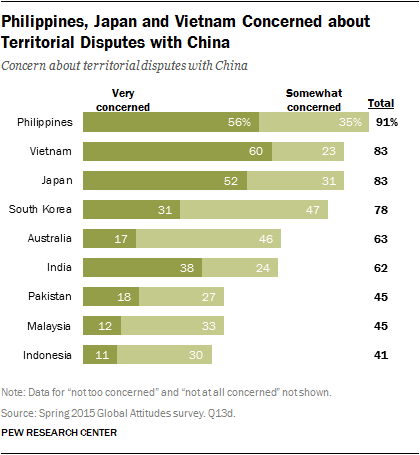
Roughly half of those surveyed have a favorable view of India (median of 51% not including Indians). This includes more than six-in-ten Vietnamese (66%), South Koreans (64%) and Japanese (63%). But only 24% of Chinese and 16% of Pakistanis see India in a positive light. These views of India are generally unchanged from last year. The most upbeat about India are the Vietnamese, but even there only 22% say they feel very favorably toward India. The most intense anti-India views are in Pakistan, not surprisingly given the long, fractious Indo-Pakistani history. In Pakistan, 56% see India very unfavorably. In comparison, 63% of Americans hold a favorable opinion of India.
The younger generation of Asians is quite enamored with India. About seven-in-ten Vietnamese ages 18 to 29 (72%) have a favorable view of the world’s second-most-populous and fastest-growing large economy, as do 67% of young Japanese. This compares with 77% of young Americans who see India favorably. The respondents most critical of India are older Pakistanis (80% unfavorable). These are people who experienced, or whose parents experienced, the traumatic 1947 partition of India and Pakistan.
South Korea enjoys particular popularity among younger Asians: 93% of Vietnamese, 74% of Filipinos and 68% of Malaysians ages 18 to 29 express a favorable opinion of the country.
Views of Regional Leaders
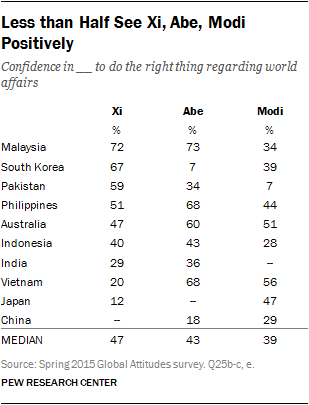
Across the Asia-Pacific region, none of the major national leaders tested – Chinese President Xi Jinping, Japanese Prime Minister Shinzo Abe and Indian Prime Minister Narendra Modi – garner majority support. But regional medians mask widely disparate assessments of the three by individual countries.
A median of 47% of those surveyed in nine Asia-Pacific countries, not including China, have confidence in Xi to do the right thing regarding world affairs. (By comparison, 69% of publics in the Asia-Pacific region voice confidence in U.S. President Barack Obama.)
Xi’s strongest supporters are in Malaysia (72%) and South Korea (67%). Some of the Chinese president’s biggest fans are South Koreans (81%) ages 50 and older and Filipinos (59%) ages 18 to 29.
Just 12% of Japanese have confidence in Xi, with 82% voicing no confidence. And Vietnamese ages 18 to 29 (71% no confidence) also distrust him.
But neither the South Koreans (7% confidence) nor the Chinese (18%) are big fans of Japan’s leader. In fact, 63% of South Koreans say they have no confidence in Abe at all.
A median of 39%, not including India, have confidence in India’s Modi to do the right thing regarding world affairs. In only two countries – Vietnam (56%) and Australia (51%) – do half or more of those surveyed express faith in Modi’s handling of foreign policy. Modi’s greatest support outside of India is among younger Vietnamese (60%).
Not surprisingly – given India’s fractious relationship with Pakistan and Modi’s leadership of the Hindu nationalist Bharatiya Janata Party (BJP) – just 7% of Pakistanis, most of whom are Muslims, have confidence in Modi. Roughly half of Pakistanis (52%) have no confidence in Modi at all. And his lowest backing is among older Pakistanis (64% no confidence).
But, overall, Modi suffers from a lack of recognition. A quarter or more of respondents in six of the nine countries surveyed voiced no opinion about him as a leader.
Australia’s Gender Gap
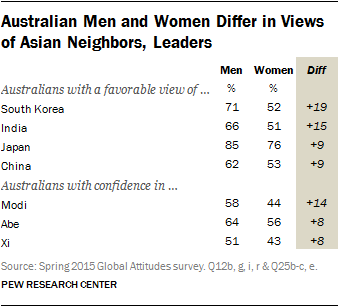
There are some gender differences in how many people in the Asia-Pacific region view each other and their leaders. But much of this may be attributable to very high levels of nonresponses among the women surveyed. However, there are striking gender gaps in Australia on views of major Asia-Pacific countries and leaders.
There is a 19-percentage-point differential between Aussie men’s views of South Korea (71% favorable) and Aussie women’s opinions (52%). There is a 15-point gender gap in views of India (66% of men, 51% of women). Similarly, far more Aussie men (58%) have confidence in Indian Prime Minister Modi than do Aussie women (44%).




